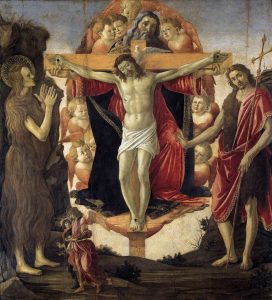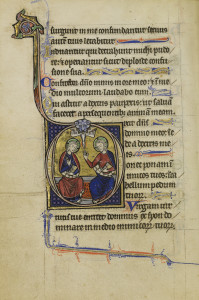Illuminations on the Lectionary readings for June 12, 2022 (Trinity Sunday C)
First Reading: Proverbs 8:1-4, 22-31
We celebrate Trinity Sunday as the season after Pentecost begins.

Holy Trinity with Mary Magdalene, John the Baptist and Tobias and the Angel (1491-1494), tempera and oil painting on panel by Sandro Botticelli (1445-1510). Courtauld Gallery at the Courtauld Institute of Art, London. (Click image to enlarge.)
We hear a distant foreshadowing of a triune God at the moment of creation in Genesis, when God the Creator utters God’s creative Word and breathes a Spirit wind over the waters to separate light from darkness and land from sea. In Sunday’s first reading from the book of Proverbs, we learn that Wisdom was there, too, personified as a woman. In these poetic verses we hear Wisdom’s expression of delight in the newly made world and all that is in it.
Psalm: Psalm 8
In Psalm 8 we lift our voices in joyful appreciation to the God who created this beautiful world and everything that lives on it. God has made humankind only a little lower than the angels, the Psalmist sings. God adorns us with glory and honor. God has given humanity mastery over all creation, and charges us to be dutiful in that husbandry.
Alternate to the Psalm: Canticle 13
Canticle 13, “A Song of Praise” from the Book of Common Prayer, offers a litany of praise and exaltation to God as our Creator and King. This Canticle recalls the three young men who danced and sang in defiance of the flames in King Nebuchadnezzar’s fiery furnace. With God’s protection, they walked unharmed through the fire, singing a hymn of praise to God and all creation. These verses, a modern addition to the original song in Daniel and the apocryphal book of Azariah, shout resounding praise to the Trinity: Father, Son, and Holy Spirit.
Second Reading: Romans 5:1-5
Is Paul offering the dubious wisdom, “No pain, no gain” in his letter to the Christian community in Rome? Hardly. Paul does not say that suffering is good, much less that God makes us suffer. Rather, he urges his audience to rejoice in God’s grace in spite of their suffering. Paul was writing to a mixed congregation of formerly pagan and Jewish Christians who had faced frequent persecution. He tells them that God’s love, poured into us through the Holy Spirit, provides the strength to hold on to hope even in the face of suffering.
Gospel: John 16:12-15
This short passage for today, Trinity Sunday, is the last of several recent readings from John’s account of Jesus’s talk with the disciples at the Last Supper. It concludes that conversation with Jesus’s reminder that there are things about God that we just can’t understand, but also his assurance that the Holy Spirit – “the Spirit of truth” – will come to guide them, bearing the glory of Creator and Son and guiding all toward the truth.

